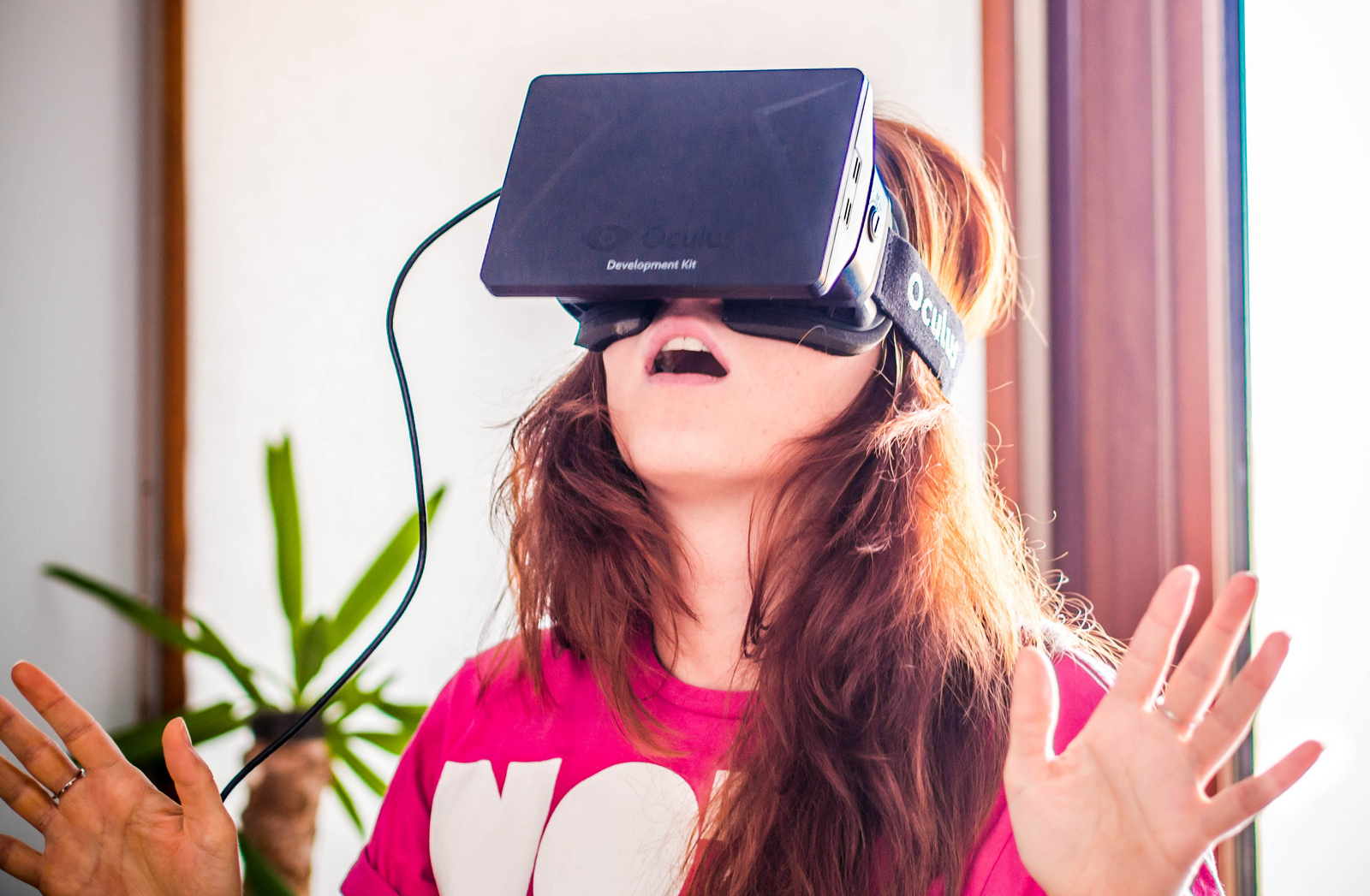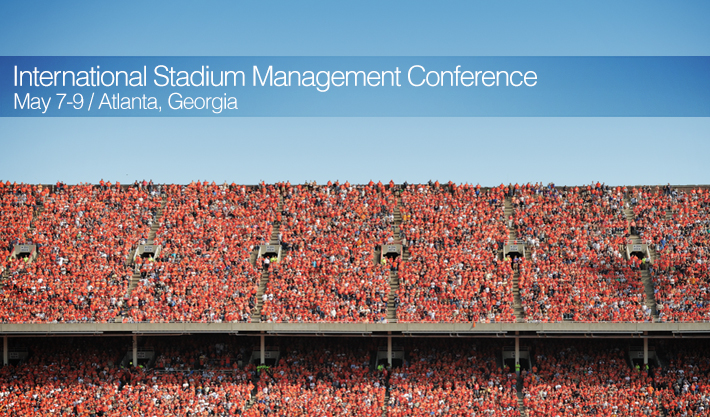Why Facebook Buying Oculus Could Affect Your Venue
Facebook surprised the tech world yesterday when it said it was buying Oculus VR, a virtual reality gaming company.
“Our mission is to make the world more open and connected,” Facebook CEO Mark Zuckerberg wrote in a post on his company’s site. “For the past few years, this has mostly meant building mobile apps that help you share with the people you care about. We have a lot more to do on mobile, but at this point we feel we’re in a position where we can start focusing on what platforms will come next to enable even more useful, entertaining, and personal experiences.”
Zuckerberg wrote Oculus’ mission is to “enable you to experience the impossible,” and he sees (no pun intended) a variety of ways in which this new partnership can work.
“Imagine enjoying a court side seat at a game, studying in a classroom of students and teachers all over the world, or consulting with a doctor face-to-face—just by putting on goggles in your home,” he wrote. “This is really a new communication platform. By feeling truly present, you can share unbounded spaces and experiences with the people in your life. Imagine sharing not just moments with your friends online, but entire experiences and adventures.”
Let’s get that imagination ball rolling. Tell us how you could see (once again, no pun intended) harnessing this technology for your venue’s own benefit. I’ll start with one: Perhaps now if a concert is sold out, special virtual reality tickets could be sold for those who want to experience it at home. Now, your turn. Let your imagination go wild and please share your thoughts in the comments section.
(photo credit: Sergey Galyonkin via photopin cc)
Jason Rittenberry on Why You Should Attend ISMC
Our International Stadium Management Conference takes place in Atlanta, Georgia, May 7-9. This is a great opportunity for stadium and racetrack managers to meet together, learn from one other, and make new connections.
Over the weeks leading up to the conference, we’ll have many of the presenters and organizers offer their thoughts about the event and why you should attend. This week we feature Jason Rittenberry, CFE, president and CEO of IRG Sports + Entertainment.
 Why do you feel it’s important for managers to attend this conference?
Why do you feel it’s important for managers to attend this conference?
I am a strong believer in face-to-face interaction and networking with our colleagues and other leaders in the industry. While the Stadiums Committee has provided a knowledge base through webinars the past two years, there is no replacement for personal interaction with your peers when it comes to learning. The return of ISMC after a few years marks a resurgence in interest from our members in the stadiums sector. Whether you are an executive leader or a young professional, this conference will have something to offer everyone with educational sessions and panels, opportunities for networking, and fun social events.
What’s one topic or session that attendees will benefit from and why?
While I feel all of our sessions are strong, I am looking forward to the session on managing legal issues. Insurance and legal issues are sometimes topics that stadium managers want to avoid and hope they don’t have to deal with. In this session, we will hear from the experts in the insurance and legal fields on some easy things we can do to minimize our risk and make things easier for us when something does happen in our stadium.
The ‘Unbooth’ is Here
This week, Trade Show News Network reported on EXHIBITOR2014, a trade show held in Las Vegas, and tailored to its own—trade show and event industry professionals. So with our own planning and preparations well underway for IAVM VenueConnect Annual Conference and Trade Show, taking place July 26-29 in Portland, Oregon, we thought it would be a good time to remind our Allied members, current exhibitors, and potential exhibitors about how much fun it can be to put on a great show for the attendees.
The stars of the 2014 EXHIBITOR show:
A giant Earth Harp by William Close, an artist from the Elan Artists Group, created the biggest buzz and drew huge crowds (most holding their iPhones high to catch the spectacle) inside the Global Experience Specialists booth. Since the instrument took up pretty much the entire exhibit, the GES booth became an ‘unbooth,’ with staffers equipped with iPads working around the perimeter.
The theme of an ‘unbooth’ continued at IQ 3D. Initially conceived to explain projection mapping, it turned out that it can also work well for exhibit designers as well. The company created a completely white exhibit sporting the sign “Where’s the booth?” Attendees were invited to put on a Google Glass and voila!—a virtual exhibit appeared all around them.
A ‘selfie on steroids’ was gathering a crowd at the Pixe Social space, where attendees could get their photo on the cover of Exhibitor magazine, even if just for sharing on Facebook.
And finally, at Kaon Interactive, the booth sported a 3D display application with animations and a badge scanner that instantly sends an email with a link to the company’s webinar.
We are excited to see what our own exhibitors will be unveiling at VenueConnect 2014 in Portland. There are still booth spaces available, and we’ll be recognizing the most creative and informative booths at the show.
Read the full TSNN ‘Unbooth’ story here.
Reserve your booth now to exhibit at IAVM VenueConnect 2014 in Portland, OR.
(Image: From Exhibitor magazine’s Facebook page)
Japanese Soccer Club Punished for Racist Banner
Fans of the Urawa Reds hung a “Japanese Only” banner in Saitama Stadium during a March 8 match, and it stayed up until the game was over. Because of this, the football (soccer) team was forced by the Japanese Professional Football League to host a game in an empty stadium on Sunday, March 23. The league’s chairman, Mitsuru Murai, said that Urawa’s failure to take down the banner made the club just as guilty as the fans who put it up.
“At first we only thought that the banner ‘could be construed as a discriminatory message’ but we were too lenient,” a Reds team official told the Japan Daily Press. “We now consider it as definitely ‘a discriminatory message.’’’
The 63,700-seat stadium, which is one of the planned football venues for the 2020 Summer Olympic Games, had advertisements taken out of the stadium on game day and replaced with signs promoting the United Nation’s Sports for Peace program. And even though they played to empty seats, the athletes supported the league’s punishment.
“One thing I can say is that sport is not something to bring discrimination into,” Reds player Tadanari Lee told the Japan Times. “I’m a football player and all I want to do is play football. I’d really like this kind of thing to stop. Through the media, a lot of people know what this game was all about and why it happened. We wore the Sports for Peace T-shirts and we were happy to play our part. Hopefully we can keep doing so.”
How do you think people would react to punishment like this in a U.S. venue?
(Image: Japan Daily Press)
Fairness is a Double-edged Sword for Managers
Being fair is exhausting. That’s the assessment from a study out of Michigan State University (MSU), which shows how fairness in workplace decisions can mentally and emotionally wear down bosses.
“Structured, rule-bound fairness, known as procedural justice, is a double-edged sword for managers,” said Russell E. Johnson, an assistant professor of management at MSU. “While beneficial for their employees and the organization, it’s an especially draining activity for managers. In fact, we found it had negative effects for managers that spilled over to the next workday.”
Eighty-two bosses were surveyed twice a day for a few weeks, and the researchers found that those who reported mental fatigue from procedural fairness situations were less cooperative and socially engaging with employees the following day.
“Managers who are mentally fatigued are more prone to making mistakes, and it is more difficult for them to control deviant or counterproductive impulses,” Johnson said. “Several studies have even found that mentally fatigued employees are more likely to steal and cheat.”
The reason procedural justice is mentally fatiguing, Johnson said, is because bosses have to conform to fairness rules (e.g., suppressing personal biases, being consistent, and letting employees voice concerns).
“Essentially managers have to run around making sure their subordinates’ perceptions remain positive, whether the threat to the atmosphere of the workplace is real or imagined. Dealing with all of this uncertainty and ambiguity is depleting,” Johnson said.
Burnout will always be a challenge for fair managers, Johnson said, but they should create situations that allow them to cope with it better. Suggestions include getting enough sleep, taking short mental breaks throughout a workday, eating a healthy diet, and completely separating work and home life.
If you’re a boss, how do you overcome burnout? Please share your ideas with us in the comments section.
Do you want to receive a Front Row News weekly digest?
Categories
- Allied (861)
- Architecture (147)
- Arenas (747)
- Career (897)
- Convention Centers (895)
- Education (623)
- Events (1,544)
- Food & Beverage (193)
- Foundation (113)
- Guest Experience (1,496)
- Industry News (2,270)
- Leadership (1,888)
- Marketing (150)
- Membership (2,000)
- Music (213)
- Performing Arts Centers (454)
- Professional Development (409)
- Research (127)
- Safety & Security (442)
- Sports (763)
- Stadiums (608)
- Student (159)
- Technology (516)
- Ticketing (92)
- Touring (82)
- Trends (364)
- Uncategorized (742)
- Universities (218)
- Video (25)
- Young Professional (198)
Twitter Feed
- Twitter feed loading
Recent Posts
- Seattle Convention Center Announces Strategic Leadership Appointment and Growth Initiatives for 2026
- Peggy Daidakis Humbly Made Convention Center History
- Welcome to Our Newest Members
- New Member Benefit! IAVM Partners with Advantage Training to Elevate Staff Readiness and Guest Experience
- Charlotte Convention Center Welcomes Two New Leaders to its Management Team
Categories
- Allied
- Architecture
- Arenas
- Career
- Convention Centers
- Education
- Events
- Food & Beverage
- Foundation
- Guest Experience
- Industry News
- Leadership
- Marketing
- Membership
- Music
- Performing Arts Centers
- Professional Development
- Research
- Safety & Security
- Sports
- Stadiums
- Student
- Technology
- Ticketing
- Touring
- Trends
- Uncategorized
- Universities
- Video
- Young Professional
Archives
- December 2025
- November 2025
- October 2025
- September 2025
- August 2025
- July 2025
- June 2025
- May 2025
- April 2025
- March 2025
- February 2025
- January 2025
- December 2024
- November 2024
- October 2024
- September 2024
- August 2024
- July 2024
- June 2024
- May 2024
- April 2024
- March 2024
- February 2024
- January 2024
- December 2023
- November 2023
- October 2023
- September 2023
- August 2023
- July 2023
- June 2023
- May 2023
- April 2023
- March 2023
- February 2023
- January 2023
- December 2022
- November 2022
- October 2022
- September 2022
- August 2022
- July 2022
- June 2022
- May 2022
- April 2022
- March 2022
- February 2022
- January 2022
- December 2021
- November 2021
- October 2021
- September 2021
- August 2021
- July 2021
- June 2021
- May 2021
- April 2021
- March 2021
- February 2021
- January 2021
- December 2020
- November 2020
- October 2020
- September 2020
- August 2020
- July 2020
- June 2020
- May 2020
- April 2020
- March 2020
- February 2020
- January 2020
- December 2019
- November 2019
- October 2019
- September 2019
- August 2019
- July 2019
- June 2019
- May 2019
- April 2019
- March 2019
- February 2019
- January 2019
- December 2018
- November 2018
- October 2018
- September 2018
- August 2018
- July 2018
- June 2018
- May 2018
- April 2018
- March 2018
- February 2018
- January 2018
- December 2017
- November 2017
- October 2017
- September 2017
- August 2017
- July 2017
- June 2017
- May 2017
- April 2017
- March 2017
- February 2017
- January 2017
- December 2016
- November 2016
- October 2016
- September 2016
- August 2016
- July 2016
- June 2016
- May 2016
- April 2016
- March 2016
- February 2016
- January 2016
- December 2015
- November 2015
- October 2015
- September 2015
- August 2015
- July 2015
- June 2015
- May 2015
- April 2015
- March 2015
- February 2015
- January 2015
- December 2014
- November 2014
- October 2014
- September 2014
- August 2014
- July 2014
- June 2014
- May 2014
- April 2014
- March 2014
- February 2014
- January 2014
- December 2013
- November 2013
- October 2013
- September 2013
- August 2013
- July 2013
- June 2013
- May 2013
- April 2013
- March 2013
- February 2013
- January 2013
- May 2012
- March 2012
- December 2011
- November 2011
- October 2011
Recent Comments
- Frank Bradshaw, Ph.D., CVE on John Meyer, CVE, a Tireless Advocate of Certification for Venue Professionals, Has Died
- Neil Sulkes on Hilary Hartung, Friend to Many in Venue Marketing, Has Left Us
- Jason Parker, CVE on The Devastation of Hurricane Helene and How We Can Support One Another
- Larry Perkins on Touhey Testifies Against Speculative Ticketing Before Congressional Subcommittee
- Peter Secord on Major Players for Planned Elkhart Amphitheater Were in the Mix at VenueConnect





